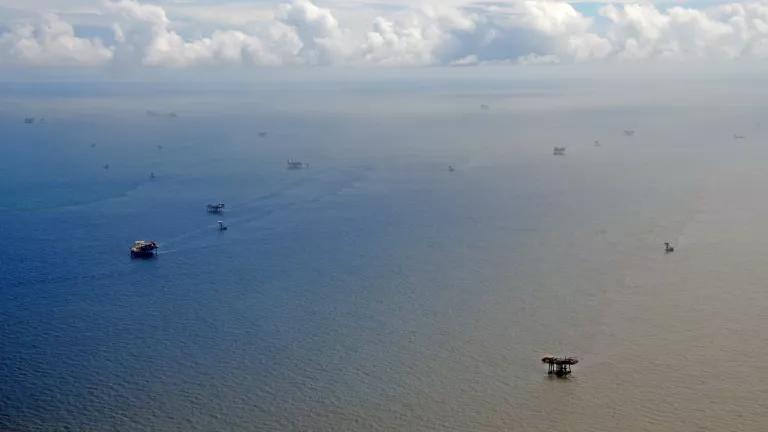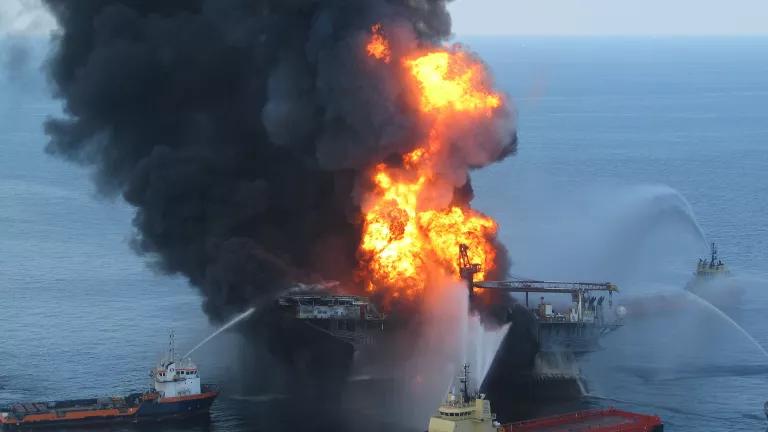As the country watches the oil slick licking the Gulf’s shores in horror, residents are looking at something else – their shrinking budgets. The economic impacts of the Deepwater Horizon spill are begin to emerge, and the worst may be on the way.
Fishermen cut off from their fishing grounds for who knows how long can seek jobs cleaning up the very spill that prevents them from fishing, but it’s unclear how many will get work.
Some hotels are filled up with oil cleanup crews and reporters, but for others cancelations are rolling in from vacationers who don’t want to relax by a oil spill. Fishing tournaments are being postponed and fishing trips canceled. The Times-Picayune quotes Theophile Bourgeois, who operates 10 charter boats and two fishing lodges: “In reality, this time of year I should be booking 10 trips a day … That’s decreased about 20 percent.”
The economic value of the Gulf of Mexico’s ocean resources are being hit hard, and it will take time to truly understand the impacts.
TOURISM:
- In 2003, tourism and recreation comprised 71 percent of the employment in the Gulf region’s ocean economy.
RECREATIONAL FISHING:
- A 2006 National Marine Fisheries Service report noted that 6.2 million recreational anglers in the Gulf region spent $2.2 billion on more than 23 million fishing trips in 2006.
- A similar report in 2008 noted that 3.2 million resident recreational anglers took a Gulf of Mexico fishing trip in 2008.
- In 2008, eastern Florida and the Gulf region’s commercial fishing industry generated more than $10.5 billion in sales, more than $5.6 billion in income, and supported more than 200,000 jobs in 2008.
COMMERCIAL FISHING:
- More than 75 percent of the nation’s commercial fish and 80 to 90 percent of its recreational fish spend part of their lives in estuary habitats – oiled wetlands will impact the breeding areas and nurseries for a variety of fish and shellfish, and the fishing.
- Many of the Gulf region’s key species are likely to be the first casualties of spill: oysters cannot flee the low dissolved oxygen areas caused by oil on the water’s surface and the newly spawned larvae of shrimps and crabs – the catch of the future – are likely to be closer to the water’s surface and any floating oil.
BIRDING:
- In 2006, more than 7 million people participated in bird watching in eastern Florida and the Gulf region; wildlife watchers in this region in general spent nearly $7 billion on expenditures (e.g., equipment purchases like binoculars and cameras).
- Currently, it is peak spring migration for colorful songbirds that winter in South and Central America and nesting season begins soon for terns, plovers, and egrets. All of these species depend on the Gulf marshes to refuel after long flights and could be impacted by oiled resources.
The most difficult assessment to make is what the long-term impacts of oil on the Gulf region’s resources will be. Much depends on the winds, weather, and how much shoreline and open ocean life are contaminated by the oil and the materials used to disperse the oil. We do know that oil spills have decadal consequences:
- Scientists investigating the long-term impacts of the Exxon Valdez spill estimate that nearly 20,000 gallons of oil from that spill remain in Prince William Sound, continuing to harm threatened and endangered species and undermine their recovery.
- Marine mammals, sea birds, fish, shellfish, and other sea life are extremely vulnerable to oil pollution and the long-term toxic effects can impair reproductive success for generations. Studies have shown that tiny amounts of oil – as little as one part per billion – can harm pink salmon and cause their eggs to fail.
- Researchers discovered long-term effects on shellfish, crabs, seabirds, whales and sea otters in years following oil spills in Alaska, Massachusetts and Spain – issues ranged from altered blood chemistry and higher levels of stress hormones to erratic behavior, contaminated eggs, and long-term population declines.
All we know is that that the short and long-term economic impacts will be severe for a Gulf population already recovering from several hurricanes and our national recession. More analysis will be generated in the days to come and I’m certain that plans will be put into place to help some of the struggling communities. That said, we need to make sure that these economic impacts are not overlooked as we make decisions for our energy future. We must learn from this spill and protect our fragile and valuable ocean resources for the future.




